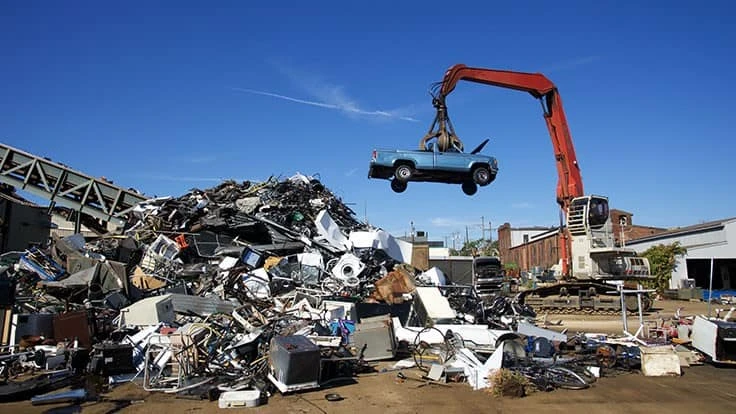
TIna | stock.adobe.com
The California Department of Toxic Substances Control has issued a request for comments from Aug. 31 through Sept. 7 related to proposed emergency regulations to amend title 22, California Code of Regulations, division 4.5, sections 66260.10, 66261.6, and 66273.9. The agency says it is seeking to clarify the definition of scrap metal found in sections 66260.10 and 66273.9 by aligning it with the federal definition of scrap metal while also removing duplicative language in the current state definition of scrap metal. DTSC also proposes amending section 66261.6 to clarify the conditions under which scrap metal could be exempted, as a “recyclable material,” from regulatory requirements of hazardous waste.
The proposals have grown out of concerns about fires and hazardous waste releases from metal shredders, the DTSC says.
If the proposals are approved by the Office of Administrative Law, metal shredding facilities in the state would be required to avoid “releases of toxic metals like copper, lead, and zinc; monitor environmental conditions; and set aside financial assurances in the event the facility must be closed to address safety concerns,” according to the DTSC website. Metal shredder operators would have 30 days to apply for interim authorization to continue their operations until they transition into a protective permit under the interim standards.
According to the comment period notice from the DTSC, “The August 2021 finalization of DTSC’s analysis of the metal shredder industry (“Final Report”), along with several recent findings and occurrences, led DTSC to determine that the current regulatory system has created an unforeseen emergency necessitating immediate action to avoid serious and imminent harm to the public peace, health, safety and general welfare.”
The Final Report states in part, “Metal shredding facilities generally do not produce waste that exceeds the federal regulatory levels established by the United States Environmental Protection Agency (U.S. EPA) under the Resource Conservation and Recovery Act (RCRA) and thus are not federally regulated as a hazardous waste. Metal shredding facilities do, however, generate waste that exceeds California's regulatory thresholds for the characteristic of toxicity, and is recognized by DTSC to be a non-RCRA hazardous waste.”
The DTSC has determined that unprocessed obsolete scrap metal arriving at auto shredding facilities is waste because consumers have discarded the material and that, before being shredded, the depolluted metal feedstock did not meet the definition of a hazardous waste under California law. The agency also has determined that metal shredder aggregate, the mixture of recoverable ferrous and nonferrous metals and nonrecoverable metal shredder residue, including plastics, rubber, glass, foam, fabrics, carpet, wood, residual amounts of fluids such as fuels, oils and grease, dirt and/or other debris, exiting the hammermill shredder does not meet the definition of scrap metal under California law and is hazardous waste and therefore is not exempt from regulation under the California Hazardous Waste Control Law.
According to the DTSC’s Final Report, “Because metal shredder aggregate and metal shredder residue must both be managed as hazardous waste, and because metal shredding facilities are engaged in treatment activities on the aggregate and residue, a form of authorization is required for these hazardous waste treatment activities.”
The Institute of Scrap Recycling Industries (ISRI), Washington, opposes the DTSC's proposed emergency action. ISRI's Vice President of Advocacy Adina Renee Adler shared the following statement with Recycling Today: "There is simply no legitimate emergency on which the proposed action can be met. Shredders operate in a safe and environmentally responsible manner, having spent hundreds of millions of dollars over the last 10 years to upgrade their facilities and install the latest in environmental control and process technologies. Regulating shredders as hazardous waste treatment facilities is neither needed nor would it even address the incidents DTSC cites as creating the need in the first place. This is in stark contrast to the industry’s voluntary initiatives of the last several years, which will yield long-term and effective results. DTSC also failed to consider the devastating impact such a move will have on supply chains for clean steel and aluminum infrastructure as well as the tens of thousands of jobs supported by the recycling industry. Worse, the very low-income, minority and environmental justice communities they seek to protect will be the worst affected by these job losses and the blight that is sure to come when end-of-life vehicles and appliances have nowhere to go but empty lots in urban and rural areas throughout the state. In our comments, we called upon DTSC to reconsider their proposal. If there are legitimate concerns they believe need to be addressed, we are eager to work closely with DTSC to identify appropriate solutions."
Latest from Recycling Today
- BMW Group, Encory launch 'direct recycling’ of batteries
- Loom Carbon, RTI International partner to scale textile recycling technology
- Goodwill Industries of West Michigan, American Glass Mosaics partner to divert glass from landfill
- CARI forms federal advocacy partnership
- Monthly packaging papers shipments down in November
- STEEL Act aims to enhance trade enforcement to prevent dumping of steel in the US
- San Francisco schools introduce compostable lunch trays
- Aduro graduates from Shell GameChanger program





